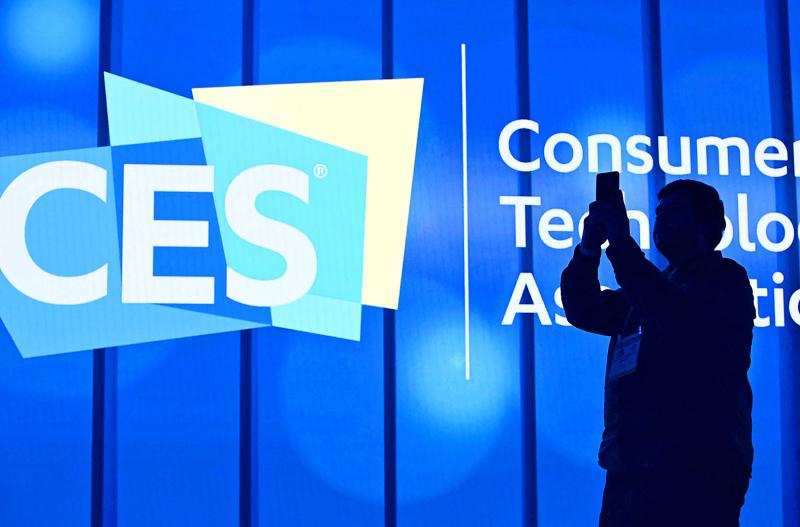Is anyone going to the CES gadget show this year?
A long-simmering question in the tech world will finally get its answer as the influential gadget show returns to the Las Vegas Strip after a hiatus caused by the COVID-19 pandemic.
“We know it will be a smaller show this year, for obvious reasons,” said Jean Foster, senior vice president of the Consumer Technology Association (CTA), the event’s organizer.

Photo: AFP
Several huge tech companies have abandoned plans to attend in person. The latest sign of its dwindling size was Friday’s announcement that CES would run one day shorter than originally planned.
The sprawling exhibition floors open tomorrow as the spread of the Omicron variant of SARS-CoV-2 has heightened concerns about the safety of indoor events and international travel.
The CTA was late last month anticipating between 50,000 and 75,000 attendees for this week’s conference, down from more than 170,000 who came for the last in-person gathering two years ago.
Some die-hard CES devotees were mulling the choice to go or stay home right up until last week.
“An online CES is not a real CES,” said the Netherlands’ Prince Constantijn last month. “You’ve got to see the products and meet the people.”
However, a week later, the royal who regularly serves as a special envoy for Dutch technology start-ups had opted to stay home. His country is sending a bare-bones crew to CES. So are many big tech companies — if they send anyone at all.
The last physical CES in January 2020 pumped an estimated US$300 million into the Las Vegas economy. Few attendees would have known then about the COVID-19 outbreak emerging in central China, which was months away from being declared a pandemic.
The CTA took the conference online last year.
The trade group announced eight months ago that it was ready to head back to Nevada, but would offer options for remote participants to see some of it virtually.
With a smaller audience and the same sprawling footprint occupied by about 2,000 exhibitors, and a desire to keep people distanced, Foster said the “main change for people” would be more empty space and wider aisles.
Even without a pandemic to dampen the party, tech industry analyst Carolina Milanesi said that “big industry events like this are becoming less important than they used to be,” as digital technology has supplied other ways to network and keep up with trends.
CES used to stand for Consumer Electronics Show, but Milanesi said the decades-old gathering has become less a place to find the next line of consumer gadgetry and more focused on longer-term technology cycles, such as self-driving cars or artificial intelligence applications being fused into homes and cities.
“You no longer go to CES to see what’s going to be in the Best Buy,” Milanesi said.
New expo categories centered around the digital assets called non-fungible tokens, or NFTs, as well as space technology and food, reflect the latest tech buzzwords on people’s minds.
Milanesi has regularly attended CES for a decade. Given public health concerns, she decided only last month about going this year, but she plans to do things differently — visiting the exhibition halls, but skipping big speaking events she can watch in her hotel room.
“I haven’t decided yet on the cocktail hours,” she said. “That’s a big reason to go to CES and meet people face to face. With a glass in your hand, people get a little more comfortable discussing things.”

Intel Corp chief executive officer Lip-Bu Tan (陳立武) is expected to meet with Taiwanese suppliers next month in conjunction with the opening of the Computex Taipei trade show, supply chain sources said on Monday. The visit, the first for Tan to Taiwan since assuming his new post last month, would be aimed at enhancing Intel’s ties with suppliers in Taiwan as he attempts to help turn around the struggling US chipmaker, the sources said. Tan is to hold a banquet to celebrate Intel’s 40-year presence in Taiwan before Computex opens on May 20 and invite dozens of Taiwanese suppliers to exchange views

Application-specific integrated circuit designer Faraday Technology Corp (智原) yesterday said that although revenue this quarter would decline 30 percent from last quarter, it retained its full-year forecast of revenue growth of 100 percent. The company attributed the quarterly drop to a slowdown in customers’ production of chips using Faraday’s advanced packaging technology. The company is still confident about its revenue growth this year, given its strong “design-win” — or the projects it won to help customers design their chips, Faraday president Steve Wang (王國雍) told an online earnings conference. “The design-win this year is better than we expected. We believe we will win

Chizuko Kimura has become the first female sushi chef in the world to win a Michelin star, fulfilling a promise she made to her dying husband to continue his legacy. The 54-year-old Japanese chef regained the Michelin star her late husband, Shunei Kimura, won three years ago for their Sushi Shunei restaurant in Paris. For Shunei Kimura, the star was a dream come true. However, the joy was short-lived. He died from cancer just three months later in June 2022. He was 65. The following year, the restaurant in the heart of Montmartre lost its star rating. Chizuko Kimura insisted that the new star is still down

While China’s leaders use their economic and political might to fight US President Donald Trump’s trade war “to the end,” its army of social media soldiers are embarking on a more humorous campaign online. Trump’s tariff blitz has seen Washington and Beijing impose eye-watering duties on imports from the other, fanning a standoff between the economic superpowers that has sparked global recession fears and sent markets into a tailspin. Trump says his policy is a response to years of being “ripped off” by other countries and aims to bring manufacturing to the US, forcing companies to employ US workers. However, China’s online warriors